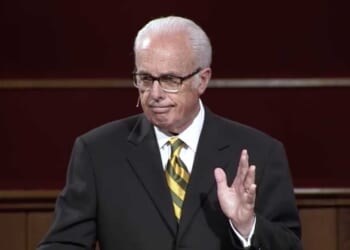Andrew Griffith is Shadow Secretary of State for Business and Trade and was a business executive for more than 25 years before entering Parliament in 2019.
It is hard to imagine the late Norman Tebbit, that fierce Cold War warrior and no-nonsense champion of free enterprise, regarding Labour’s Employment Rights Bill as anything short of a retrograde lurch back to the 1970s — an era he spent much of his political career trying to drag Britain away from.
As the House of Lords later today continues to debate the trade union inspired, ‘Bill for Unemployment’, too few recall what an economy in which trade unions call the shots really looks like. It is billed as a “New Deal for Working People” — but to a proper Thatcherite like Tebbit, it would have looked suspiciously like a rearmament of the union barons who once brought Britain to its knees.
The price will not be paid by the cossetted public sector or those who remain in work, but by those looking for their first chance of a job – trying to take their shot at life. It is an inter-generational unfairness at least equivalent to the challenge of the housing market and is being explicitly created by this socialist government. Data from the recruitment platform, Indeed, shows advertised graduate roles are now down around one-third (33 per cent) compared to 2024 and unemployment has already been higher every month this government has been in office. Not to be able to find work is demoralising and a criminal waste of human talent yet both Kemi and I have raised this at the despatch box to the complete indifference of Labour.
We Conservatives understand the importance of businesses – particularly the smallest. One amendment we have tabled is to exempt them from some of the worst impacts with research from the Federation of Small Businesses showing that 72 per cent are specifically worried about the increased cost of compliance, such as the need for specialist HR or legal support.
Tebbit, who served as Secretary of State for Employment from 1981 to 1983, was arguably the architect of the Conservative government’s long war on militant unionism. He rightly saw that the overreach of powerful unions, exemplified by the Winter of Discontent, was incompatible with a healthy economy and a free society. His reforms — which outlawed secondary picketing, mandated secret ballots before strikes, and made unions legally accountable for unlawful actions — were not ideological window dressing. They were foundational to Mrs Thatcher’s strategy to restore economic growth.
As he famously said in 1981, “We do not intend to see again the scenes of intimidation, of mass picketing, and of political strikes which disfigured our country in the 1970s.” For Tebbit, employment policy was not about abstract ‘rights’ but about restoring balance — protecting individual workers from being bullied by their union as much as by their employer. The “right to work” mattered more than the right to walk out.
One of his legacies is that an unemployment rate which peaked at 11.5 per cent in 1982, fell sharply from then onwards and that the Blair and Brown socialist governments gratefully accepted the new consensus about a fair balance between worker rights and the needs of businesses for flexibility.
Contrast that with Labour’s proposals today. Lowering the threshold for union recognition, ‘swipe to strike’ ballots, shorter notice strikes and the almost complete de-regulation of the conduct and disclosure rules binding trade unions. They will see the re-colonisation of the private sector by trade unions, backed up by a new publicly funded, ‘lawfare’ quango, the ‘Fair Work Agency’ able to sue employers even where not a single employee has complained. Tebbit would have bristled at the idea of tilting the playing field so decisively in favour of collective action and against managerial discretion.
He also would have raised a sceptical eyebrow at the economics.
Labour argues that enhancing workers’ rights boosts productivity and growth. But to Tebbit, a man shaped by experience as a pilot, minister and businessman, that argument would ring hollow without competitiveness and flexibility. “A job is not created by passing a law saying there shall be a job,” he once said.
The only sustainable jobs come from businesses – large and small – and enterprise requires the flexibility to hire and fire, to adapt and compete. The latter point on competition is something this government simply does not understand. It’s a category error Whitehall makes all the time on employment costs, taxes and above all the price of energy. It is why so many young people – as well as London listings – are voting with their feet to more competitive overseas locations.
That is not to say Tebbit was anti-worker. Far from it.
Just as practised in his own life, he believed deeply in aspiration, self-reliance, and personal responsibility. But he was scornful of anything that treated workers as passive victims. His infamous “on your bike” comment — mischaracterised as callous — was actually a call to action, encouraging people to seek opportunities rather than wait for them to be delivered by the state.
Labour’s bill, by contrast, risks reverting to a paternalist model that sees individuals as helpless without state or union protection. That mindset would have struck Tebbit as fatal to the very dynamism Britain needs.
When we get back into government, we are already pledged to reverse all of the expanded trade union powers in the Bill. It is a clear policy commitment already made. But that will take time and I feel for those who lives are blighted directly by this government in the meantime.
In the end, what would Tebbit have made of the Employment Rights Bill? His warning would be simple and direct: if you make it harder to employ people, don’t be surprised when fewer people get employed.








![Illegal Alien Walked Free After Decapitating Woman, Abusing Corpse for Weeks [WATCH]](https://www.right2024.com/wp-content/uploads/2025/07/1753013138_Illegal-Alien-Walked-Free-After-Decapitating-Woman-Abusing-Corpse-for-350x250.jpg)






